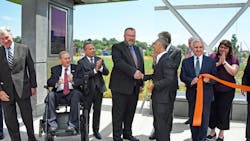Federal, state officials join RIPTA in celebrating high-frequency bus corridor that creates key intermodal connection
The Rhode Island Public Transit Authority (RIPTA) unveiled its new high-frequency bus corridor that serves the city of Providence.
RIPTA staff were joined by members of the state’s Congressional delegation, Rhode Island Gov. Dan McKee and Providence Mayor Jorge Elorza.
The Downtown Transit Connector (DTC) runs from Rhode Island Hospital to the Providence Train Station with five-minute frequency. It features important transit infrastructure improvements such as bus-only travel lanes, traffic signals that give priority to buses and custom shelters with real-time digital information signage. There are also designated bike lanes along portions of the 1.4-mile corridor that also create a direct bus-rail connection in the city.
RIPTA can provide the frequent service by funneling seven bus routes through the corridor which traverses the city’s rapidly growing Innovation & Design District. The frequent service began running last year, as construction continued on the bus lanes and other features.
“Although this past year was a difficult one for everyone, we are happy to be able to gather together to celebrate this project,” said RIPTA CEO Scott Avedisian. “The DTC is an important transit improvement for our capital city, and it is also example of public partners working together on a project that uses federal funds to support economic growth and enhance people’s quality of life. We are very grateful to our federal delegation for securing the funding that was essential for this project and we are also grateful for support from the state and the city of Providence. We know that access to transit and intermodal connections are key as our state rebounds from the impacts of the global pandemic.”
The roughly $17-million project is funded largely by a $13 million U.S. Department of Transportation TIGER grant initially awarded to Providence in 2015 for a streetcar project. The remaining funds are coming from the state.
“Safe. Convenient. Comfortable. Frequent. Reliable. Affordable. Accessible. That’s what riders want and what RIPTA is delivering with this new downtown connector service,” said U.S. Sen. Jack Reed (D-RI), a senior member of the Appropriations Committee. “This streamlined service will help get people where they need to go, whether it’s work, school, medical care, shopping, or entertainment. This area offers so much, and the Downtown Transit Connector makes it easier to get around.”
“The new Downtown Transit Connector is a convenient way for residents, commuters and tourists to get to the outer reaches of downtown Providence,” said U.S. Sen. Sheldon Whitehouse (D-RI). “This high-frequency bus-rail link has the potential to boost businesses located downtown and in the growing Innovation District, and it makes getting around Providence without a car a lot more feasible.”
The seven RIPTA routes running through the DTC--Routes 3, 4, 51, 54, 58, 62 and 72--travel primarily along Dorrance and Eddy Streets. The five-minute frequency they provide more than doubles past service levels in the Innovation District and surrounding Jewelry District neighborhood. The DTC directly connects nearby colleges and universities to new medical and innovation centers.
“Projects like this are vital to our state,” said Gov. McKee. “Public partners worked together to find the best use of valuable federal funding. Investing in our transit infrastructure will benefit our businesses and educational institutions, while also creating access to jobs and other opportunities for the public. This project creates a vital transit route in our capital city.”
“In Providence, we invest in transportation innovation by prioritizing equity and ease," said Mayor Elorza. "The Downtown Transit Connector expands our city's high-quality, affordable transit options while simultaneously improving accessibility to allow for growth and development. I am confident that the DTC will move us even closer to becoming a city that works for everyone."
